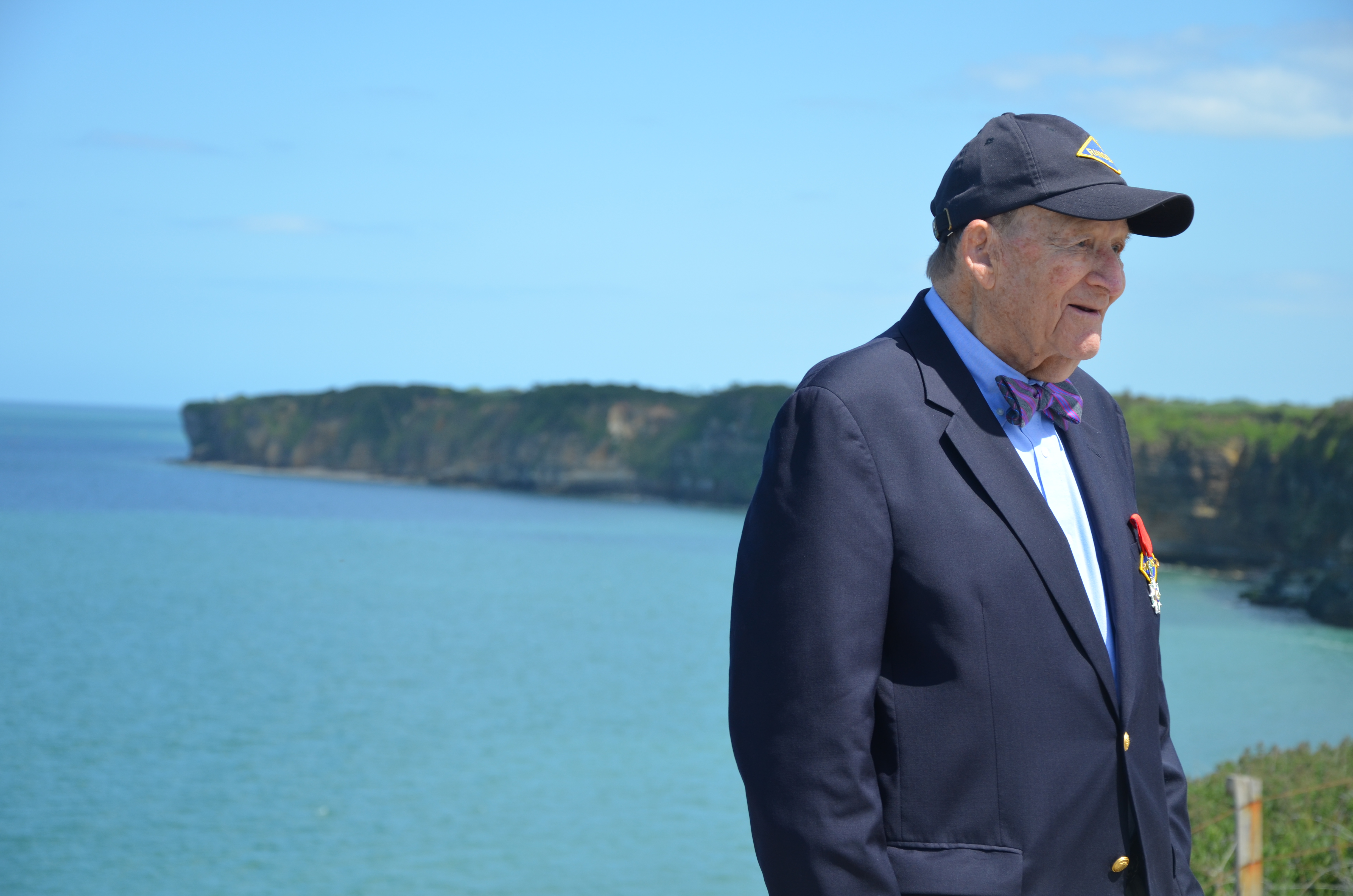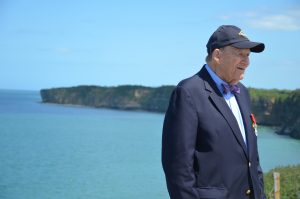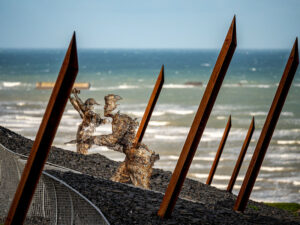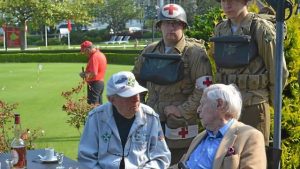The veteran of the Second World War George Klein in 2015 during the commemorations of the landing at Pointe du Hoc. Photo: Marc Laurenceau
August 21st 2017 : George Klein did not land at Pointe du Hoc on D-Day
Author: Marc Laurenceau
The etymology of the word “History” refers to the Greek term “historia” and means an inquiry into the past facts of mankind. What follows proves that the investigation takes on its full meaning in history.
George G. Klein was one of the great celebrities of the 73rd anniversary of the landing of Normandy in June 2017: at the age of 96, this American veteran participated in numerous commemorations in Calvados and in the English Channel, with his “Ranger” hat, signing hundreds of autographs and marking all those he met by his incredible kindness. His good humor and smiles were not feigned: George expressed his joy of returning to Normandy for the second time and meeting the Normans, explaining “I am not a hero. The real heroes are those who have lost life here“. His return to Europe was made possible thanks to a crowfunding program supported by dozens of donors and the organization of his trip was supported by the volunteers of the D-Day Overlord association.
But only weeks after his return to the United States, the extraordinary news is made public: George Klein is not the one he claims to be. On June 6, 1944, the American veteran was not among the 2nd Ranger Battalion to attack the cliffs of Pointe du Hoc, this formidable German artillery position threatening the landing beaches. On D-Day, he is not in Normandy but in Northern Ireland with the B Battery of his artillery regiment (46th Field Artillery Battalion, 5th Infantry Division). This discovery is the result of the work of several historians, including Marty Morgan and Gary Sterne (who is the owner of Maisy’s battery museum).
For nearly two decades, George Klein claimed to have been one of the officers of the F Company of the 2nd Ranger Battalion. With an impeccable attention to detail, he recounted the three days spent fighting the Germans at Pointe du Hoc, drawing on a solid knowledge of these events. His story had every reason to be plausible: with a (real) experience in the Rangers’ unit, the artilleryman had broke his ankle during a climbing training during the year 1943 and had to give up any hope of remaining in this elite unit. Back in his artillery regiment, he accepts this failure with difficulty.
Lieutenant George Klein then imagines the sequence and builds his new story accordingly: he sets up a version explaining his quick return to the 2nd Ranger Battalion, thus justifying the absence of George on the list of 225 Rangers who actually participated in the assault of the battery of Pointe du Hoc. George rushes into the shoes of a “supernumerary” lieutenant, whose duty is to immediately replace a platoon leader unable to continue his mission. He knows the operation in the smallest detail for having read it in different books. George explains that he was wounded on 6 June 1944 by the blade of a German bayonet, and that he was only evacuated to England on 8 June 1944, the date of the end of the fighting at Pointe du Hoc.
Time went on, although the first time he took part in the commemorations in Normandy was in 2015 (a trip organized by the American company “Wish of a Lifetime”, specialized in financing individuals wishes). American press dedicated to George are numerous, and so are videos on social networks and in the collections of history enthusiasts. His name appears in the reference book dedicated to the Rangers, The Battalion, which quotes him as having participated in the assault of Pointe du Hoc.
However, George Klein should not be ashamed of his real contribution to the liberation of Europe during the Second World War: deployed from 26 July 1944 to 23 July 1945 with the 46th Field Artillery Battalion, he was seriously wounded in combat in the Moselle region on 17 November 1944. He was awarded the Bronze Star and the Purple Heart medals by the Americans, as well as with the Croix de Guerre 39-45 medal by the French for his commitment during the Second World War. France awarded him the famous Legion of Honor on 6 June 2015.
But the prestige of a unit like the Rangers, as well as certainly the disappointment of not having participated in a major battle of World War II (even though he had risked his life on numerous occasions), have probably strengthened the temptation. Indeed, Europe liberation battles are not limited to the battle of Normandy, and yet the veterans of the battles of Champagne, Lorraine or Alsace are unknown in our history books: for George Klein, the fact of not having been considered in the same way as the Rangers despite his personal investment would have caused an immense wound whose only dressing was to create such a universe. Trapped into a lie of that shaped him in the eyes of his entourage and from which he could no longer escape, he finally resolved to tell the truth to his family, his relatives and the organizations that supported him for several years.
This sad story is unfortunately not an isolated case: it recalls that of other veterans who transformed the truth to appropriate some of the glory of having participated in one of the most breathtaking fights of the Battle of Normandy: Howard Manoian and Eugene A. Cook Jr, unmasked in 2009 and February 2017. They both imagined a career in American airborne troops, also participating in numerous commemorative ceremonies bearing the insignia of units to which they had not belonged.
Lieutenant George G. Klein, artillery officer, in 1945






We have given such exultation to paratroopers of the 82nd and 101st, and to those who landed on the Normandy Beaches (only on the morning of June 6th, as if a D-Day + 1, 2, or 7 was not as honorable), and have selectively honored veterans who fought in the most popular or media attractive campaigns that men who risked their lives in other critical battles are basically sidelined. Just look around when you are in Normandy during D-Day commemorative events and an uninformed person would think the 82nd and 101st were the ones who singlehandedly liberated that region – so little attention is given to the Engineers, Navy, 4th Infantry, 29th, etc. Everyone bows at Dick Winter’s memorial (and with good reason), but few can converse about General Teddy Roosevelt, Jr, and Col Rudder. I am sad for Mr. Klein and the choices he made. I am sad for those who were taken in by his deception. But real men come clean and live in truth and I conclude from reading this article that Mr. Klein has done just that to his family and friends. The humiliation must be enormous. Let’s not crucify him. There is such a small number of WWII veterans alive and even fewer who can make the trip to Normandy and to other battlefields. Let’s not continue to focus on just Band of Brothers or the Boys of Pointe du Hoc or just those veterans who landed in the first wave of 6-6-44. Let’s celebrate and honor all veterans. On another note: the article was well-written. I applaud the author for writing the truth in a sensitive manner.
This man is a hero. He picked up arms and defended our country and posted for duty when we needed help. I am thankful to Mr. Klein and wish that all the veterans who fought in the heat of battle got the same amount of glory. Were that the case, this footnote about his involvement in one part of it would not matter.
For whatever reason, sometimes for no reason at all, people sometimes lie about their past, even when the lie has no way of benefiting them. To a lesser degree, an old sports adage applies. It goes, “The older I get, the better I was.”
Misrepresenting one’s military service is much more serious, though. In doing so, a person seeks to elevate his or her own perceived value while diminishing that rightfully belonging to someone who really did the work, faced the dangers and accomplished the missions. The lie creates no overt harm, but it does leave an indelible blemish on the teller when the truth comes out.
Mr. Kline is a hero, he didn’t need to embellish his exploits, he is a decorated war hero , but unfortunately he has tarnished his service and worse dishonored those who died that day landing on the beach.
Mark, I am author working on a similar subject as Stolen Valor. I was wondering whether you would be willing to give me a few minutes of time to ask you some on-the-record questions in either an email or over the phone.
Thank you in advance for your consideration.
Blessings, Ian Punnett